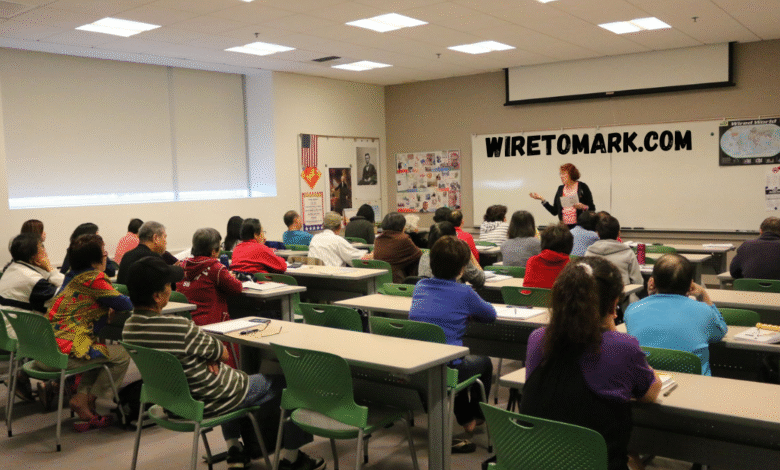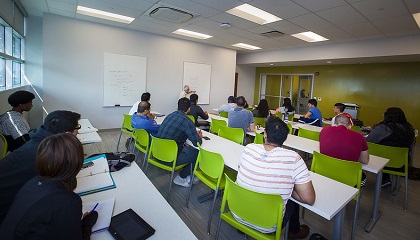ESL Classes A Path to Confident Communication

Learning a new language can be a challenge, but when it comes to English, the benefits are undeniable. ESL classes offer more than just grammar lessons and vocabulary drills; they open doors to opportunities. Whether someone is studying for work, school, or personal growth, these classes provide the tools to build fluency and confidence in real-world conversations.
Another key advantage is that learners get a supportive environment. It can be intimidating to practice a language outside the classroom, especially when mistakes happen. ESL classes are designed to remove that fear by creating a safe space where everyone is learning together. This sense of community makes the process less overwhelming and far more enjoyable.
ESL Classes for Beginners
For those just starting, ESL classes are structured to guide learners step by step. In the beginning stages, students focus on the basics—things like greetings, simple sentence construction, and everyday vocabulary. This foundation builds the confidence needed to engage in small conversations, which gradually expand into more complex interactions.
Beyond the lessons themselves, instructors often incorporate cultural context. Understanding how people use English in daily life is just as important as learning the words themselves. With this combined approach, students begin to recognize not only what to say but also how to say it naturally.
ESL Classes and Everyday Life
One of the most powerful aspects of ESL classes is how quickly lessons can be applied to real situations. From ordering food at a restaurant to filling out forms at work, learners find that the skills gained in class directly impact their day-to-day life. This makes the learning experience both practical and rewarding.
Another benefit is the improvement in listening and comprehension. It’s not uncommon for learners to understand grammar rules on paper but struggle when hearing spoken English. ESL classes often include listening exercises, role-playing, and conversations that help bridge this gap, making real-life communication much smoother.
Building Confidence Through Practice
Confidence doesn’t come overnight, and language learning is no exception. ESL classes emphasize practice, because the more a learner uses English, the more natural it feels. Instructors often encourage group discussions, presentations, and storytelling activities to push students out of their comfort zones.
The magic happens when mistakes are seen not as failures but as stepping stones. This shift in mindset is crucial. Students realize that every error is just another chance to improve. Over time, this builds a stronger, more confident voice in English.
Choosing the Right Program
Not all ESL classes are created equal. Some focus heavily on academic skills like essay writing and reading comprehension, while others prioritize conversation and pronunciation. The right choice depends on the learner’s goals. For example, someone preparing for university may need advanced writing practice, while a professional might need strong speaking skills for meetings and presentations.
Another factor to consider is flexibility. With online and in-person options, learners can choose what works best for their schedules. Online classes often provide the convenience of learning from anywhere, while in-person courses offer face-to-face interaction. Both have their unique strengths, and the decision ultimately comes down to personal preference.
How ESL Classes Support Professional Growth
In today’s job market, English proficiency is more valuable than ever. Employers often look for candidates who can communicate clearly with colleagues, clients, and global partners. ESL classes play a major role in helping learners meet these expectations by focusing on practical workplace language.
The skills gained extend far beyond vocabulary. Learners also develop the confidence to participate in interviews, write professional emails, and present ideas clearly. This can make the difference between being overlooked for opportunities and stepping confidently into a new role.
ESL Classes for Students Abroad

For international students, navigating a new culture while keeping up academically can feel overwhelming. ESL classes provide essential support by bridging the language gap. With specialized lessons in reading, writing, and comprehension, students become better equipped to succeed in their studies.
Moreover, these classes often include guidance on cultural norms in academic settings, such as classroom discussions, teamwork, and writing standards. This helps learners adapt more quickly, allowing them to focus on achieving their academic goals.
The Role of Teachers in ESL Classes
Teachers are the heart of any ESL program. Their patience, creativity, and ability to connect with students make the learning experience engaging and effective. Many instructors go beyond traditional teaching methods, incorporating games, multimedia resources, and group projects to keep students motivated.
It’s also the personal encouragement from teachers that makes the biggest impact. A kind word after a student answers a tough question can be the confidence boost they need to keep going. Teachers act not only as instructors but also as mentors who guide learners through the challenges of mastering a new language.
Cultural Learning in ESL Classes
Language and culture are deeply connected, and ESL classes recognize this by including lessons that explore cultural practices, idioms, and traditions. Learning how English is used in various contexts helps students sound more natural and avoid misunderstandings.
This cultural exposure also enhances social interactions. Whether it’s understanding humor, participating in celebrations, or navigating professional etiquette, learners gain the tools to thrive in English-speaking communities. It’s not just about the words—it’s about the connections those words help create.
Overcoming Challenges in ESL Learning
It’s no secret that learning English comes with its challenges. From tricky grammar rules to pronunciation hurdles, students often feel frustrated at times. ESL classes address these struggles directly by breaking down difficult concepts into manageable lessons and offering consistent practice.
Support systems also play a huge role. Peers who share the same journey can provide encouragement and share strategies that work. Overcoming challenges together makes the process less lonely and far more rewarding.
The Future of ESL Classes
As technology continues to advance, ESL classes are evolving too. Online platforms, language apps, and even AI-based learning tools are changing the way students access and practice English. These innovations provide greater flexibility and personalized learning experiences.
However, one thing remains constant: the human element. While technology offers convenience, the interaction with teachers and peers keeps the learning process dynamic and relatable. The future of ESL classes will likely combine the best of both worlds—digital tools with human connection.
FAQs About ESL Classes
What are ESL classes?
ESL classes are courses designed to help non-native speakers learn English for academic, professional, or personal purposes.
Who can benefit from these classes?
Anyone looking to improve their English skills, from beginners to advanced learners, can gain from ESL programs.
Are online ESL classes effective?
Yes, online classes can be just as effective as in-person lessons, offering flexibility and personalized resources.
Do ESL classes improve job opportunities?
Absolutely. English proficiency is highly valued in the workplace, and these classes equip learners with practical communication skills.
How long does it take to become fluent?
Fluency depends on factors like dedication, practice, and starting level. Consistent effort in ESL classes can significantly speed up progress.



